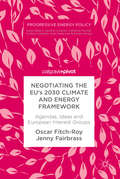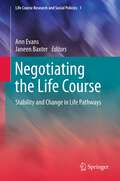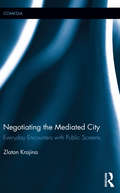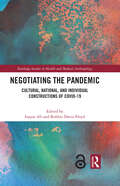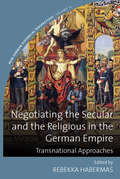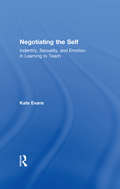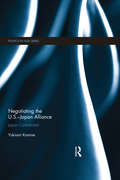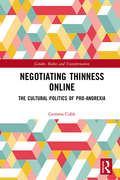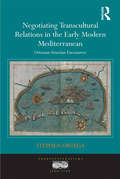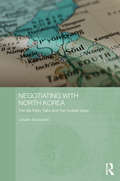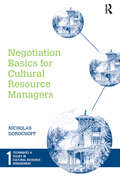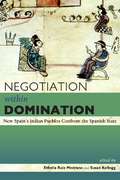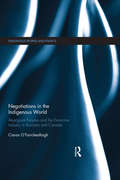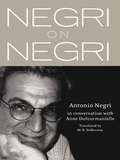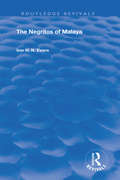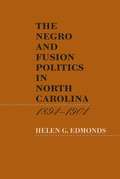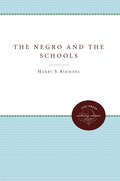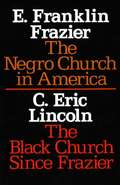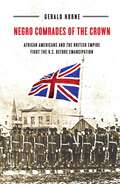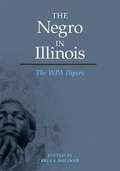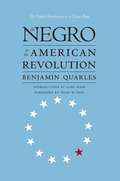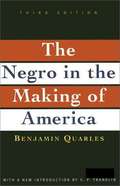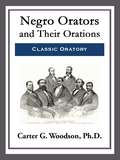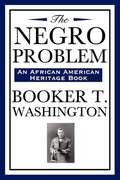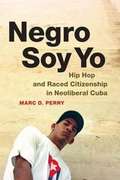- Table View
- List View
Negotiating the EU’s 2030 Climate and Energy Framework: Agendas, Ideas And European Interest Groups (Progressive Energy Policy Ser.)
by Oscar Fitch-Roy Jenny FairbrassIn 2014, European heads of state selected new targets for the EU as part of the 2030 climate and energy framework. These targets will guide the ambition and nature of EU policy in this area until 2030 and are likely to have important implications for Europe’s transition to a low-carbon economy. This book exposes the role of civil society and business interest groups in setting the policymaking agenda and defining the range of options for the framework. Based on a unique sample of 32 in-depth interviews with Brussels policy elites, this book casts EU interest representation in a new light. In a novel application of the ‘multiple streams approach’, sequential chapters present the problems faced by policymakers, the range of policy options available to address them and the political constraints within which policy entrepreneurs attempted to attached policies to problems.
Negotiating the Life Course
by Janeen Baxter Ann EvansPathways through the life course have changed considerably in recent decades. Many of our assumptions about leaving home, starting new relationships and having children have been turned upside down. It is now almost as common to have children prior to marriage as afterwards, and certainly much more common to live together before marrying than to marry without first living together. Women are more likely to remain in the labour force after having children and many families struggle with problems of work-family balance at some stage in their lives, particularly when they have young children. But how much has really changed? Is there really more diversity in how individuals transition through these life course stages, or just variations at the margin with most people following a standard work and family life course? This volume makes use of rich longitudinal data from a unique Australian project to examine these issues. Drawing on broader theories of social change and demographic transitions in an international context, each chapter provides a detailed empirical assessment of the ways in which Australian adults negotiate their work and family lives. In doing so, the volume provides important insight into the ways in which recent demographic, social and economic changes both challenge and reproduce gender divisions.
Negotiating the Mediated City: Everyday Encounters with Public Screens (Comedia)
by Zlatan KrajinaThis book is an interdisciplinary empirical investigation of how people interact with public screens in their daily lives. In more and more surprising locations, screens of various kinds appear within the sightlines of passers-by in contemporary cities. Outdoor advertisers target audiences which are increasingly mobile, public art uses screens to interrogate urban change, while postmodern architecture finds electronic imagery a suitable tool of expression. Traditionally, urban sociology research has assumed that people seek to filter urban stimuli, but recent accounts of public screens suggest producers design and position display interfaces site-specifically, so as to engage with those moving past. This study offers insight both into the dynamics of actual encounters and into the long-term process of how people learn to live with repeated invitations to consume media in public spaces. The book includes four cases: street advertising, underground transport advertising, and installation art in London (UK) and media façade architecture in Zadar (Croatia). Krajina shows that maintaining familiarity with everyday surroundings in media cities that change beyond citizens' control is a temporary achievement--and a recursive struggle. Finalist for the Jane Jacobs Urban Communication Foundation book award, 2014
Negotiating the Pandemic: Cultural, National, and Individual Constructions of COVID-19 (Routledge Studies in Health and Medical Anthropology)
by Inayat AliThis book centers on negotiations around cultural, governmental, and individual constructions of COVID-19. It considers how the coronavirus pandemic has been negotiated in different cultures and countries, with the final part of the volume focusing on South Asia and Pakistan in particular. The chapters include auto-ethnographic accounts and ethnographic explorations that reflect upon experiences of living with the pandemic and its implications for all areas of life. The book explicates people’s dealings with COVID-19 at various levels, situates the spread of rumors, conspiracy theories, and new social rituals within micro- and/or macro-contexts, and describes the interplay between the virus and various institutionalized forms of inequalities and structural vulnerabilities. Bringing together a variety of perspectives, the volume relates to the past, describes the Covidian present, and offers futuristic implications. It enlists distinct imaginaries based on current understandings of an extraordinary challenge that holds significant importance for our human future.
Negotiating the Secular and the Religious in the German Empire: Transnational Approaches (New German Historical Perspectives #10)
by Rebekka HabermasWith its rapid industrialization, modernization, and gradual democratization, Imperial Germany has typically been understood in secular terms. However, religion and religious actors actually played crucial roles in the history of the Kaiserreich, a fact that becomes particularly evident when viewed through a transnational lens. In this volume, leading scholars of sociology, religious studies, and history study the interplay of secular and religious worldviews beyond the simple interrelation of practices and ideas. By exploring secular perspectives, belief systems, and rituals in a transnational context, they provide new ways of understanding how the borders between Imperial Germany’s secular and religious spheres were continually made and remade.
Negotiating the Self: Identity, Sexuality, and Emotion in Learning to Teach
by Kate EvansFirst Published in 2002. Routledge is an imprint of Taylor & Francis, an informa company.
Negotiating the U.S.–Japan Alliance: Japan Confidential (Politics in Asia)
by Yukinori KomineIn recent years, the U.S.–Japan alliance has marked several anniversaries, including 40 years since the 1969 decision on the reversion of Okinawa. These occasions have provided crucial opportunities to reassess the continuing significance of U.S.–Japan security and diplomatic relations, prompting this investigation into major issues in negotiations between the two countries. This book is the first comprehensive and comparative analysis of the U.S. and Japanese foreign policy formulation and implementation processes from 1961 to 1978, which also explores the long-term strategic significance of the U.S. deterrence in East Asia. It is based on numerous declassified and previously unused U.S. and Japanese documents, oral histories, and the author’s interviews with former officials. The book traces the origins of contemporary security and diplomatic issues back to the 1961–1978 U.S.–Japan negotiations involving secret arrangements in the reversion of Okinawa, Japan’s defense build-up, including the question of Japan’s nuclear option, and U.S.–Japan defense cooperation. Through a systematic assessment of the behind-the-scenes discussions, Dr Yukinori Komine demonstrates that external security calculations were consistently primary factors in U.S.–Japan relations. The book concludes by making policy-relevant suggestions, important for the "Pacific Century". This book offers crucial contributions to the ongoing debate regarding the increasing need for greater transparency and burden-sharing in the U.S.–Japan alliance. It will appeal to scholars and students of International Relations of the Asia-Pacific region, East Asia–U.S. relations, U.S. Politics and Japanese Politics, as well as Foreign Policy.
Negotiating Thinness Online: The Cultural Politics of Pro-anorexia (Gender, Bodies and Transformation)
by Gemma CobbThis book interrogates the thin ideal in pro-anorexia online spaces and the way in which it operates on a continuum with everyday discourses around thinness. Since their inception in the late twentieth century, pro-anorexia online spaces have courted controversy: they have been vilified by the media and deleted by Internet moderators. This book explores the phenomenon during its tipping point where it migrated from websites and discussion forums to image-centric social media platforms – all the while seeking to circumvent censorship by, for instance, repudiating ‘pro-ana’ or adopting hashtags to obfuscate content. The author argues that instead of being driven further underground, ‘pro-ana’ is blurring the boundaries between normative and deviant conceptions of thinness. Situating the phenomenon in relation to accepted constructions of thinness, promulgated by establishments as far ranging as medicine and women’s magazines, this book asks if ‘pro-ana’ holds the potential to critique that which has long been considered normal: the culture of compulsory thinness. Engaging with debates including the current climate of postfeminism and neoliberalism, digital censorship, the pre-eminence of white, middle-class, heterofemininity, and the articulation of pain in realising the thin ideal, Negotiating Thinness Online examines what happens when the margins and the mainstream merge.
Negotiating Transcultural Relations in the Early Modern Mediterranean: Ottoman-Venetian Encounters (Transculturalisms, 1400-1700)
by Stephen OrtegaNegotiating Transcultural Relations in the Early Modern Mediterranean is a study of transcultural relations between Ottoman Muslims, Christian subjects of the Venetian Republic, and other social groups in the sixteenth and seventeenth centuries. Focusing principally on Ottoman Muslims who came to Venice and its outlying territories, and using sources in Italian, Turkish and Spanish, this study examines the different types of power relations and the social geographies that framed the encounters of Muslim travelers. While Stephen Ortega does not dismiss the idea that Venetians and Ottoman Muslims represented two distinct communities, he does argue that Christian and Muslim exchange in the pre-modern period involved integrated cultural, economic, political and social practices. Ortega's investigation brings to light how merchants, trade brokers, diplomats, informants, converts, wayward souls and government officials from different communities engaged in similar practices and used comparable negotiation tactics in matters ranging from trade disputes, to the rights of male family members, to guarantees of protection. In relying on sources from archives in Venice, Istanbul and Simancas, the book demonstrates the importance of viewing Mediterranean history from a variety of perspectives, and it emphasizes the importance of understanding cross-cultural history as a negotiation between different social, cultural and institutional actors.
Negotiating with North Korea: The Six Party Talks and the Nuclear Issue (Routledge Security in Asia Pacific Series)
by Leszek BuszynskiNorth Korea’s nuclear weapons program has provoked much apprehension in the international community in recent years. The Six Party Talks were convened in 2003 to prevent North Korea from developing nuclear weapons. They brought together the US, China, Russia, Japan as well as North and South Korea in the effort to negotiate a multilateral resolution of North Korea’s nuclear program but the parties had widely different views and approaches. This book will examine the Six Party Talks as a study in multilateral negotiation highlighting the expectations vested in them and their inability to develop a common approach to the issue. It holds out some important lessons for multilateral negotiation, diplomacy and dealing with North Korea.
Negotiation Basics for Cultural Resource Managers (Techniques & Issues in Cultural Resource Management #1)
by Nicholas DorochoffAnyone in the cultural resource management world will tell you that much of the job is successfully negotiating consensus on a course of action between various stakeholders. In this volume, Nicholas Dorochoff offers the heritage management community the benefit of decades of thinking on negotiation where it is practiced daily—the business world. Brief, practical, and geared specifically for cultural resource managers, consultants, and other interested parties, the author slices the negotiation process into its various component parts and steps. In a workshop fashion, Dorochoff takes the reader through the negotiation process, showing where conflicts can arise, how they can be solved, and how a clear understanding of negotiation strategies can lead to successful resolutions. Real world examples, checklists, and resources are included. This handy guide can save cultural resource professionals from months of stalled negotiation on key projects.
Negotiation Within Domination
by Ethelia Ruiz Medrano Susan KellogNegotiation within Domination examines the formation of colonial governance in New Spain through interactions between indigenous peoples and representatives of the Spanish Crown. The book highlights the complexity of native negotiation and mediation with colonial rule across time, culture, and place and how it shaped colonial political and legal structures from the sixteenth to the eighteenth centuries. Although indigenous communities reacted to Spanish presence with significant acts of resistance and rebellion, they also turned to negotiation to deal with conflicts and ameliorate the consequences of colonial rule. This affected not only the development of legal systems in New Spain and Mexico but also the survival and continuation of traditional cultures. Bringing together work by Mexican and North American historians, this collection is a crucially important and rare contribution to the field. Negotiation within Domination is a valuable resource for native peoples as they seek to redefine and revitalize their identities and assert their rights relating to language and religion, ownership of lands and natural resources, rights of self-determination and self-government, and protection of cultural and intellectual property. It will be of interest primarily to specialists in the field of colonial studies and historians and ethnohistorians of New Spain
Negotiations in the Indigenous World: Aboriginal Peoples and the Extractive Industry in Australia and Canada (Indigenous Peoples and Politics)
by Ciaran O'FaircheallaighNegotiated agreements play a critical role in setting the conditions under which resource development occurs on Indigenous land. Our understanding of what determines the outcomes of negotiations between Indigenous peoples and commercial interests is very limited. With over two decades experience with Indigenous organisations and communities, Ciaran O’Faircheallaigh's book offers the first systematic analysis of agreement outcomes and the factors that shape them, based on evaluative criteria developed especially for this study; on an analysis of 45 negotiations between Aboriginal peoples and mining companies across all of Australia’s major resource-producing regions; and on detailed case studies of four negotiations in Australia and Canada.
Negri on Negri: in conversation with Anne Dufourmentelle
by Antonio NegriFirst published in 2004. Routledge is an imprint of Taylor & Francis, an informa company.
The Negritos of Malaya (Routledge Revivals)
by Ivor H. EvansPublished in 1937. This book, written by the well-known authority on the ethnology and archaeology of the Malay Peninsula, presents a compact and detailed account of the Negritos, one of the three paga races of the Peninsula. It brings up to date much of the previous work on this subject, and deals with all aspects of their character and environment. By way of introduction, there is a general description of the geography and development of the Peninsula, together with a discussion of statistics concerning the tribe's distribution, their health, habitat, and territories. The author then examines the various aspects of their everyday life, including social and domestic customs, hunting, agriculture, dress, ornamentation, musical instruments, and art, as well as their religious beliefs and superstitions. The chapters on their weapons are particularly detailed and informative, and the book is supported throughout by useful illustrations. Although many further studies of this area and its people have been made since the first publication of this book in 1937, its methodical and careful documentation has yet to be superseded, and it remains indispensable to all students of anthropology and sociology.
The Negro and Fusion Politics in North Carolina, 1894-1901
by Helen G. EdmondsEdmonds gives a detailed and accurate record of the political careers of prominent North Carolina blacks who held federal, state, county, and municipal offices. This record shows that the ration of Afro-American voters was so low that black domination was neither a reality nor a threat.
The Negro and the Schools
by Harry S. AshmoreThis book provides an impartial look at the whole picture of biracial education in the United States. It is also a history of segregation in education in the United States and the story of the South's effort to equalize educational opportunities for white and black children.A UNC Press Enduring Edition -- UNC Press Enduring Editions use the latest in digital technology to make available again books from our distinguished backlist that were previously out of print. These editions are published unaltered from the original, and are presented in affordable paperback formats, bringing readers both historical and cultural value.
The Negro Church In America/The Black Church Since Frazier
by E. Franklin Frazier C. Eric LincolnFrazier's study of the black church and an essay by Lincoln arguing that the civil rights movement saw the splintering of the traditional black church and the creation of new roles for religion.
Negro Comrades of the Crown: African Americans and the British Empire Fight the U.S. Before Emancipation
by Gerald HorneWhile it is well known that more Africans fought on behalf of the British than with the successful patriots of the American Revolution, Gerald Horne reveals in his latest work of historical recovery that after 1776, Africans and African-Americans continued to collaborate with Great Britain against the United States in battles big and small until the Civil War. Many African Americans viewed Britain, an early advocate of abolitionism and emancipator of its own slaves, as a powerful ally in their resistance to slavery in the Americas. This allegiance was far-reaching, from the Caribbean to outposts in North America to Canada. In turn, the British welcomed and actively recruited both fugitive and free African Americans, arming them and employing them in military engagements throughout the Atlantic World, as the British sought to maintain a foothold in the Americas following the Revolution. In this path-breaking book, Horne rewrites the history of slave resistance by placing it for the first time in the context of military and diplomatic wrangling between Britain and the United States. Painstakingly researched and full of revelations, Negro Comrades of the Crown is among the first book-length studies to highlight the Atlantic origins of the Civil War, and the active role played by African Americans within these external factors that led to it. Listen to a one hour special with Dr. Gerald Horne on the "Sojourner Truth" radio show.
The Negro in Illinois: The WPA Papers
by Brian DolinarThe Negro in Illinois was produced by a special division of the Illinois Writers' Project, one of President Roosevelt's Works Progress Administration programs. Headed by Harlem Renaissance poet Arna Bontemps and white proletarian writer Jack Conroy, The Negro in Illinois employed Richard Wright, Margaret Walker, Katherine Dunham, Fenton Johnson, Frank Yerby, Richard Durham, and other major black writers living in Chicago. The authors chronicled the African American experience in Illinois from the beginnings of slavery to the Great Migration. Individual chapters discuss various aspects of public and domestic life, recreation, politics, religion, literature, and performing arts. After the project's cancellation in 1942, most of the writings went unpublished for more than half a century--until now. Editor Brian Dolinar provides an informative introduction and epilogue which explain the origins of the project and place it in the context of the Black Chicago Renaissance.
The Negro in the American Revolution
by Benjamin QuarlesOriginally published in 1961, this classic work remains the most comprehensive history of the many and important roles played by African Americans during the American Revolution. With this book, Benjamin Quarles added a new dimension to the military history of the Revolution and addressed for the first time the diplomatic repercussions created by the British evacuation of African Americans at the close of the war. The compelling narrative brings the Revolution to life by portraying those tumultuous years as experienced by Americans at all levels of society.In an introduction, Gary B. Nash traces the evolution of scholarship on African Americans in the American Revolution from its early roots with William C. Nell to this groundbreaking study. Quarles's work not only reshaped our thinking about the black revolutionary experience but also invigorated the study of black history as we know it today.Thad W. Tate, in a foreword, pays tribute to the importance of this work and explains its continuing relevance.
The Negro in the Making of America
by Benjamin QuarlesIn The Negro in the Making of America, eminent historian Benjamin Quarles provides one of the most comprehensive and readable accounts ever gathered in one volume of the role that African Americans have played in shaping the destiny of America. Starting with the arrival of the slave ships in the early 1600s and moving through the Colonial period, the Revolutionary and Civil Wars, and into the last half of the twentieth century, Quarles chronicles the sweep of events that have brought blacks and their struggle for social and economic equality to the forefront of American life. Through compelling portraits of central political, historical, and artistic figures such as Nat Turner, Frederick Douglass, Duke Ellington, Malcolm X, and the Reverend Martin Luther King, Jr., Quarles illuminates the African American contributions that have enriched the cultural heritage of America. This classic history also covers black participation in politics, the rise of a black business class, and the forms of discrimination experienced by blacks in housing, employment, and the media. Quarles's groundbreaking work not only surveys the role of black Americans as they engaged in the dual, simultaneous processes of assimilating into and transforming the culture of their country, but also, in a portrait of the white response to blacks, holds a mirror up to the deeper moral complexion of our nation's history. The restoration of this history holds a redemptive quality - one that can be used, in the author's words, as a "vehicle for present enlightenment, guidance, and enrichment."
Negro Orators and Their Orations
by Carter G. WoodsonIn reprinting these orations the editor has endeavored to present them here as nearly as possible in their original form. No effort has been made to improve the English. Published in this form, then, these orations will be of value not only to persons studying the development of the Negro in his use of a modern idiom but also in the study of the history of the race. It is in this spirit that these messages are again given to the public.
The Negro Problem
by Booker T. WashingtonHere are six historic essays on the state of race relations during the Reconstruction and early twentieth century, written from the African American point of view. These essays show us how far race relations have progressed, and sadly how far we have yet to go. Included are "Industrial Education for the Negro," by Booker T. Washington, "The Talented Tenth," by W.E. Burghardt DuBois, "The Disfranchisement of the Negro," by Charles W. Chesnutt, "The Negro and the Law," by Wilford H. Smith, "The Characteristics of the Negro People," by H.T. Kealing, and "Representative American Negroes" by Paul Laurence Dunbar.
Negro Soy Yo: Hip Hop and Raced Citizenship in Neoliberal Cuba
by Marc D. PerryIn Negro Soy Yo Marc D. Perry explores Cuba's hip hop movement as a window into the racial complexities of the island's ongoing transition from revolutionary socialism toward free-market capitalism. Centering on the music and lives of black-identified raperos (rappers), Perry examines the ways these young artists craft notions of black Cuban identity and racial citizenship, along with calls for racial justice, at the fraught confluence of growing Afro-Cuban marginalization and long held perceptions of Cuba as a non-racial nation. Situating hip hop within a long history of Cuban racial politics, Perry discusses the artistic and cultural exchanges between raperos and North American rappers and activists, and their relationships with older Afro-Cuban intellectuals and African American political exiles. He also examines critiques of Cuban patriarchy by female raperos, the competing rise of reggaetón, as well as state efforts to incorporate hip hop into its cultural institutions. At this pivotal moment of Cuban-U.S. relations, Perry's analysis illuminates the evolving dynamics of race, agency, and neoliberal transformation amid a Cuba in historic flux.
